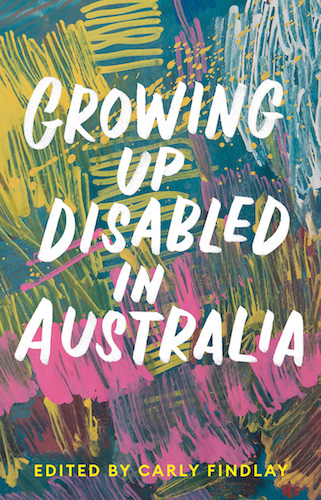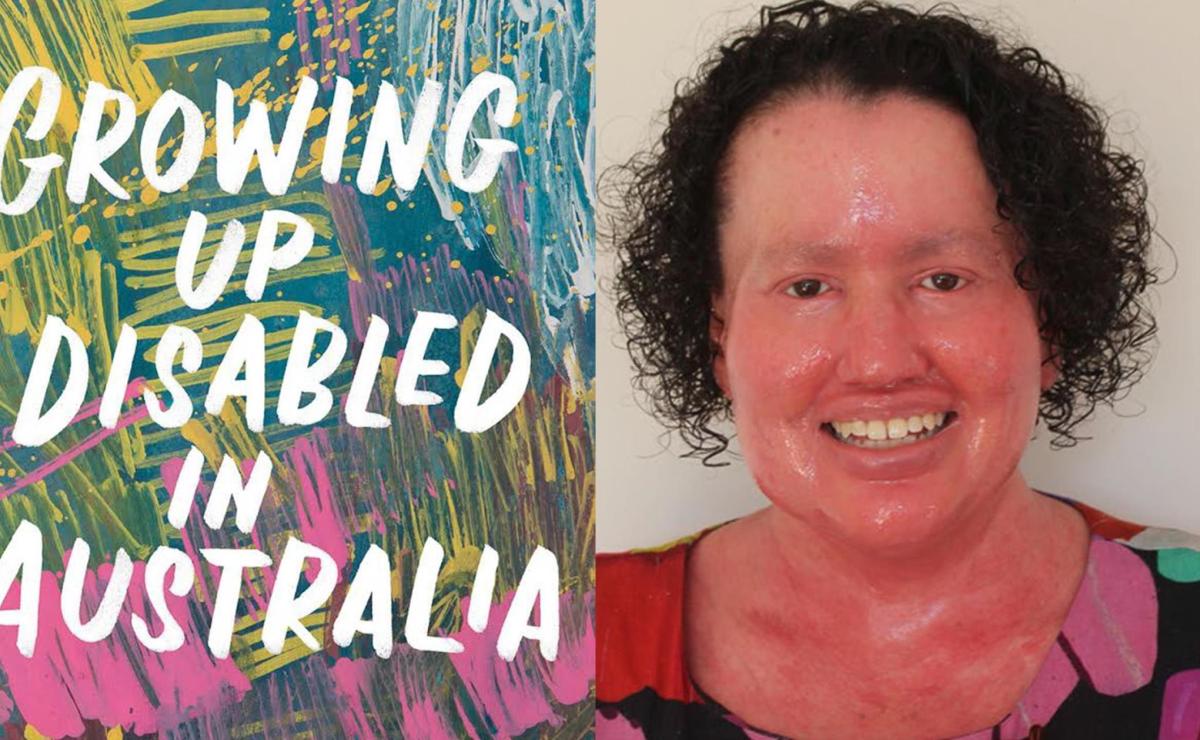Black Inc’s ‘Growing Up’ anthologies showcase the first-person experiences of people from a range of marginalised groups. Through different volumes, Asian, Aboriginal, African, and queer writers speak to what growing up in Australia was like for them.
These Own Voices narratives are a resource for understanding a multiplicity of experiences – important moments, opportunities, challenges, and attempts to reckon with the society surrounding you. Even more importantly, they give readers from these communities – whether they’ve grown up yet or not – a sense that they aren’t alone, and a framework for understanding their own identity a little better. It’s newest offering, Growing Up Disabled in Australia, edited by Carly Findlay fits firmly in the established vein of providing connection.
Read: Carly Findlay on centring disability in our latest podcast
One in five Australians have some form of disability, and yet, growing up disabled can be an isolating experience. You may not have a diagnosis, like Sarah Firth, who was left wondering, ‘why was I not like other kids?’ until adulthood. When you don’t have a diagnosis, you have no language to understand your experiences, a theme Lauren Poole explores: ‘you need to name it to get a diagnosis and to have something to shout at during particularly tense moments.’
‘One in five Australians have some form of disability, and yet, growing up disabled can be an isolating experience. You may not have a diagnosis, like Sarah Firth, who was left wondering, ‘why was I not like other kids?’ until adulthood.’
You may deal with internalised ableism that cuts you off from your community; as Findlay writes, ‘because I didn’t identify as disabled, I wasn’t able to advocate for the support I needed in school, nor recognise or speak up against discrimination.’ Tully Zygier powerfully shows how difficult disability can be to face. Even as a disability worker, it took some time to recognise herself as disabled: ‘I didn’t join the dots between my walking frame at home and the wheelchairs around me every day at work… Living with a disability was as foreign to me as it was to non-crips in an able-bodied world.’
Robin M. Eames reflects on a similar experience, their sister died very young of disability, and so it was hard for them to recognise and embrace the label for themself. ‘I couldn’t even begin to fathom the idea of disability pride, because I was still thinking about disability in terms of pain and suffering, rather than community, resistance and radical survival. I still thought of Lucy and death.’
Growing up disabled means you may be told that being disabled means you should limit your life options, as Chantel Bongiovanni was told by a teacher she shouldn’t aspire to go to university. You may have to deal with an embarrassing amount of visibility, as Fiona Murphy describes going to school with new, thick glasses with buttons and batteries that encased her hearing aids: ‘I squeeze my hands to stop them from shaking.’ Or your disability may be invisible which, as Astrid Edwards reflects, ‘makes it harder to describe to others what is going wrong with my body or to explain why I can’t do something that most people can, or why I can do it sometimes and not others.’
Read: Book Review: Catch Me If I Fall by Barry Jonsberg
You may have also only been introduced to the medical model of disability. This is the default view in our society, where the individual with a disability is understood as aberrant and requires treatment or cure. A major coming-of-age theme throughout the stories in this book is the endorsement of an alternative, social model, which views access issues and discrimination as injustices that ‘disable’ individuals. ‘When I found the social model of disability,’ El Gibbs writes, ‘it was like an explosion went off in my brain.’ It’s an empowering conclusion, because it recognises that bodies and experiences are diverse, and measures our societies based on their capacity to accommodate this reality.
Although, as Gibbs continues, the social model might not always be a preferred lens, for instance, on days where the lived reality of disability does feel immediately limiting. ‘I could engage in political action and break down external barriers all I liked, but my skin was still raw and bleeding, and I was still in pain and exhausted.’
‘Narrators come to know themselves, and reject the discriminatory, limiting, and invalidating stories projected on to them in order to find their own language, and a community.’
Still, the human rights abuses – discrimination, institutionalisation, bullying, and exclusion – experienced by contributors is fixable, and unjust. Jessica Newman-Marshall’s description encapsulates how painful and ridiculous this discrimination is. Her school made her parents pick her up in the middle of the day to take her to a nearby McDonald’s bathroom to use the accessible toilet there. She discovered that the school did, in fact, have an accessible bathroom but she couldn’t use it because it was full of sports equipment. ‘There is no space for me to use the accessible toilet. There is no space for me at all – this is space for golf clubs.’
Although there are plenty of aggravating, unjust incidences in the lives of contributors, this is ultimately a joyful collection of stories that serve as different models of self-acceptance. The anthology highlights the multiplicity of ways we can perceive disability. Narrators come to know themselves (as Andy Jackson puts beautifully, ‘I am standing as upright as I can, but this skeleton’s version of normal is cursive’), and reject the discriminatory, limiting, and invalidating stories projected on to them in order to find their own language, and a community. This anthology is vital.
Rating: 5 stars out of 5 ★★★★★
Growing up Disabled in Australia Edited by Carly Findlay
Contributors include senator Jordon Steele-John, paralympian Isis Holt, Dion Beasley, Sam Drummond, Astrid Edwards, Sarah Firth, El Gibbs, Eliza Hull, Gayle Kennedy, Carly-Jay Metcalfe, Fiona Murphy, Jessica Walton and many more
Publisher: Black Inc.
ISBN: 9781760641436
Format: Paperback
Categories: Non-Fiction, Australian
Pages: 320pp
Release Date: 2 February 2021
RRP: $29.99






